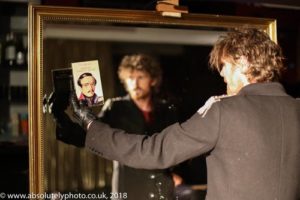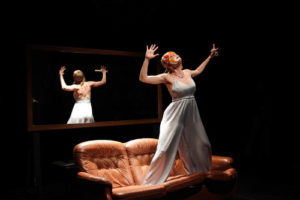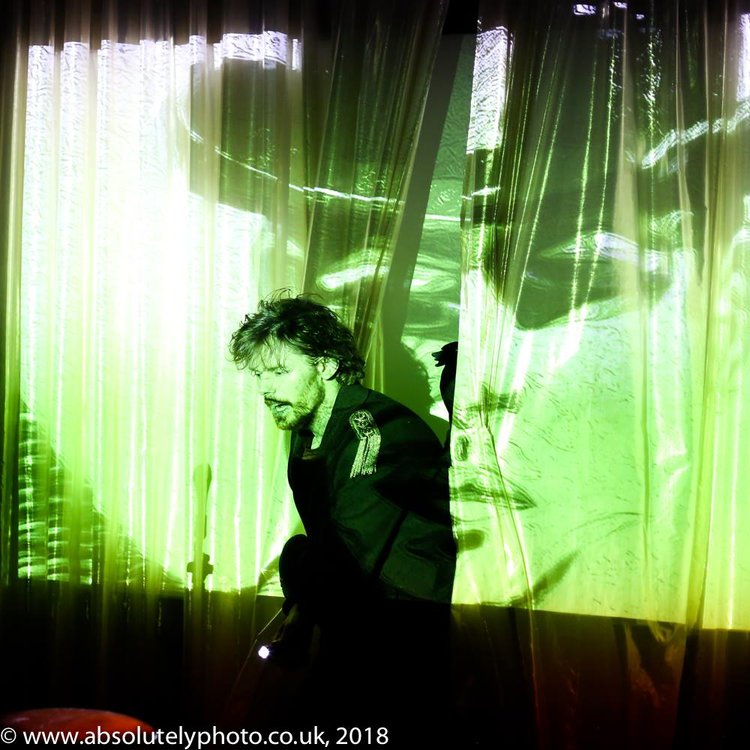How do you make a centuries-old novel exciting and relevant for a modern-day stage audience?
Award-winning theatre-makers HUNCHtheatre recently converted A Hero Of Our Time, a 180-year-old Russian novel, for performances in Edinburgh, London and St Petersburg.
In this post, George Hamilton speaks to actor and playwright Oliver Bennett and director Vladimir Scherban from HUNCH, who share their insights into staging their interpretation of the novel…

Why choose A Hero Of Our Time?
Vladimir: I studied it at school in Belarus and one day the teacher shared a critical description of [main character] Pechorin as a ‘cripple and moral monster’ that hooked me. Somehow my soul was on Pechorin’s side. Suddenly I stood up and told the teacher that I didn’t agree with her. I went to the library and found out more… then I always wanted to stage it.
Oliver: Vladimir suggested I read the text, and I could immediately see it visually and theatrically. There’s a visual quality in the writing. Lermontov also wrote theatre and was a painter and it’s clear to me that he thought in images. Practically the novel’s also amenable to theatre with its small cast of characters and fairly consistent setting.
What grabbed you in particular?
Vladimir: Pechorin: an extremely ambiguous central character. Is he good or bad? Is he an abuser or abused? The text doesn’t give us any answers. Pechorin is very charming, honest and funny. He is also reprehensible in many ways. We liked the idea of creating an anxiety and confusion in the audience about how to respond to him. We believe art should always explore ambiguity and confusion, not confirm currently fashionable opinions. Pechorin is perfect for that.
A Hero Of Our Time is told in five short stories, by three separate narrators and without a standard chronological approach. What made you decide to hone in on just one of the stories?
Oliver: Lermontov’s novel is written from multiple perspectives, which is very interesting and potentially theatrical but for our first show we thought it best to do a small section that we could really get into. The Princess Mary section of the novel just drew us more than the others, it is more of a complete whole than the other parts and there was much discussion about gender war – we thought there was an unusual and interesting angle on that.

In the show Oliver plays Pechorin and alters from narration to live action and dialogue. What was the thinking behind that?
Vladimir: I don’t really like having narrators. It often feels like a dramaturgical failure to me. But this text is a different case. It is written as a discovered diary. We are peeking in to someone’s written mind, their inner-most thoughts. They are sometimes shocking. So it made sense to us to have Pechorin narrating to the audience. He is drawing them into his confidence, seducing them into his world, just like he is doing with the characters in the play. We knew we were performing in small spaces as well and it’s a powerful thing to have someone on stage in the same small room as you saying and doing things that you might violently disagree with. It’s provocative. It’s fun.
The novel was written in 1839 in Russian and then translated into English, yet you still managed to fit a Whitney Houston-style video into the performance. How did you play with the language?
Vladimir: Lermontov’s text is very modern; it’s a lean, mean machine. It’s fast, it’s cruel, it’s funny. So that made it much easier. We were faced with the question of whether we update it or not. We decided to do both! The dialogue is all very modern and vernacular, there are modern songs, modern references. But there are also balls, duels and horses. We liked the idea of creating a theatrical space that was 21st century London and 19th century Russia at the same time, to draw the audience into the world of the play and also invite them to think about what has or hasn’t changed in that time.
How did you start?
Oliver: I sat down and typed out the whole ‘Princess Mary’ section of the novel. I found this a very effective way of internalising the whole story, starting to make it my own – as I was going to be playing the character too. As I was going through I would make small or large changes, editing and cutting whole sections, working out what could be dialogue and what narration. We would then read this through as a company and make more changes from there. From then it was all about trying everything out physically with the actors in the space.
I understand you had an interesting first performance?
Oliver: We originally made it in Vladimir’s living room, playing to around 10-12 people squeezed onto cushions. We felt this worked for the story – it is about small moments, little looks, little words, people trying to hide their real feelings. So we wanted it to be intimate. We used a dictaphone for narration – some scenes were pre-recorded and replayed live. But when we got into the bigger space in The Karma Sanctum Hotel in Soho the dictaphone just didn’t work. So we started using a microphone which allowed us to be intimate in a different way.
Vladimir: Initially part of the performance was outside, on my balcony. We tried to time our show with the sun going down outside. So by the time we talk about sunsets there was a sunset outside. When the window opened it became a window into the past, or memory. In Soho this developed into a mirror, because we didn’t have a window. And then this became an integral part of the show, about reflection, appearance, vanity and doubling. The shape of the show changed a few times. It totally depended on the venue.

At the performance we saw you had actors bouncing on sofas to symbolise a coach and horses, a stool standing in for a cliff edge, and a duelling range that was a piece of tea towel, yet it all seemed seamless and in keeping with the story.
Vladimir: Visual metaphors were especially important because it’s very much ‘literature’. It’s 75 minutes of words, basically. But the main idea of theatre is offering a universal language, which should be clear for someone who doesn’t speak English. We tried to find the material reality of the story and find the equivalent reality on the stage.
At one point Oliver had to down a glass of pure lemon juice…
Oliver: There is a place that the characters travel to in the text called Kislovodsk, which literally translates as ‘sour water’. Somehow a lemon found it’s way into rehearsals and Vlad started to link these things…the lemon almost becomes a symbol for the bitterness and rage. It is spread from person to person, like a virus. Pechorin is a virus in a health spa. The lemon is also bitter life experience, and we see how it is passed between people – it’s a cycle of cruelty. I’ve been hurt so I’m going to hurt. This is often Vlad’s process. To take something that is mentioned or alluded to in the text and use it physically to show what is happening between the characters, or what is underneath the scene.
Vladimir: We needed to find a few objects from the author’s reality and play around with them to find the metaphoric language. A lemon is just a lemon, but we twisted it, with narration, with the situation, with feelings and it became a metaphor. It made for a strong connection between the show and the audiences.
Oliver: I remember some of the first things that we tried out was how we would do the horses. We tried lots of different techniques – chairs, people, window sills… eventually sofas and stools. We ended up discovering something very simple, even childish.
Vladimir: We like circus. You could be completely uneducated and not speak any language and yet you can understand circus. Theatre is exactly the same. We want to match high-level literature and circus stuff together to make a new theatre language.
You had a cast of three. How did that limit you?
Oliver: We always knew that we would have to double-up some characters and be versatile. For example Pechorin has a close friend Dr Werner. As an experiment in rehearsals we tried making Werner a painting that happened to be on a wall in the living room – a Schiele self-portrait. I, as Pechorin, would talk to the painting and do the voice of Werner through the painting. But when we moved into the space in Soho we didn’t have the painting on the wall. So we were using a copy of the book, which has a portrait of Lermontov on the front. We started using this as Werner, alternating between the two characters by holding the book in front of my face when Werner spoke.
Vladimir: Princess Mary and Vera are played by the same actress in our version. This was one of those situations that began as necessity but became an integral part of the vision of the piece. Mary and Vera are two sides of the same coin, or a kind of ‘before’ and ‘after’ experience. This had a knock-on effect of us not being able to have Vera and Mary in the same scene together. But this led to us using a Whitney Houston-inspired pre-recorded video, which became one of the highlights of the show. Creativity works best when there are limitations!
Were there any other key challenges?
Vladimir: The main challenge was to keep this structure, the narration, and make the characters real but also just part of Pechorin’s story. Pechorin is manipulating these characters like puppets but then there are moments when it breaks and the characters take the initiative a little bit and they start to become a problem and Pechorin is not in control anymore. It is very cinematic. There are lots of different settings. It’s not dialogue, and they are always outside. It is a fast-moving world. That was an artistic staging challenge: deciding how we could keep this dynamic but find an equal way in the script and in the staging. That’s why the creation of the script and the staging were done at the same time, together.
With performances in three countries and great reviews from The Scotsman and The Times Literary Supplement, you must be pleased?
Oliver: I’m very proud of what we’ve achieved in such a short space of time – how we went from a living room to an international tour within a year.
Vladimir: I’m proud of the fact that we have introduced Lermontov to English speaking people and we have also re-opened Lermontov’s text for a Russian audience. People wanted to reread the text after seeing the show. I feel like we’ve given Pechorin another opportunity to explain himself.
Oliver Bennett’s first full-length play Europe After The Rain was shortlisted for the Papatango prize, the WiT Award, and won the Mercury Playwriting Award 2017.
Vladimir Scherban graduated from the Belarusian State Academy of Arts before working as a director and co-founding Belarus Free Theatre. He is a nominee of the Obie Award and Drama Desk Award, and the winner of the Fringe First festival in Edinburgh.
Oliver and Vladimir are currently developing a HUNCHtheatre show about a London ambulance driver’s experiences. You can find out more about HUNCH here.

